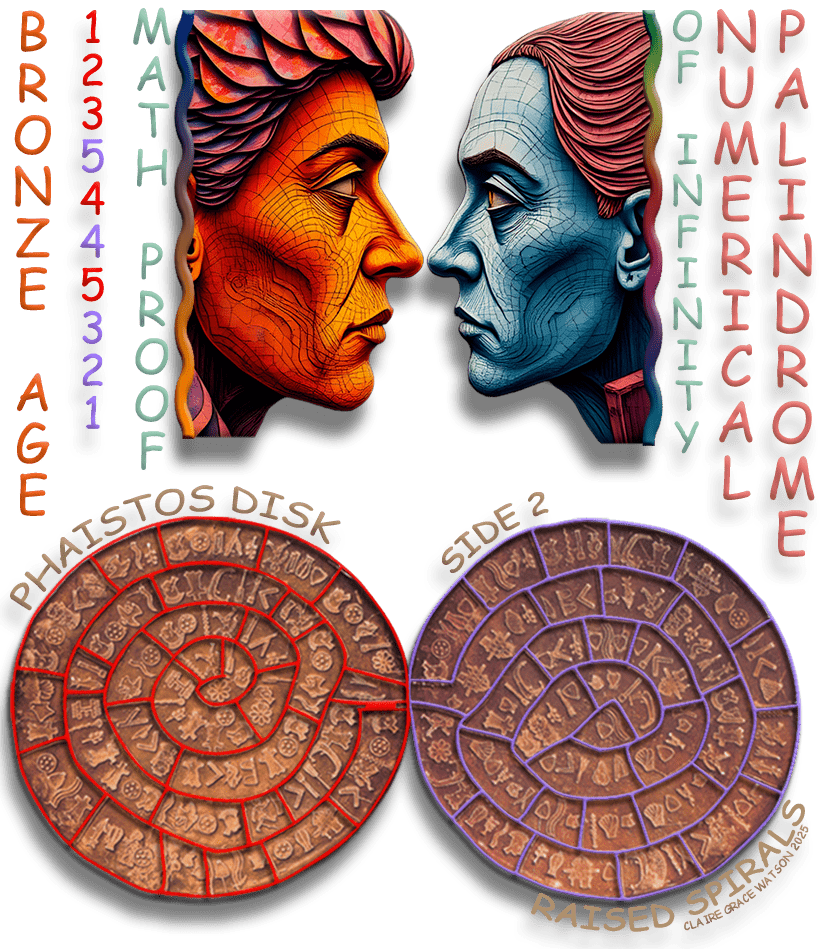
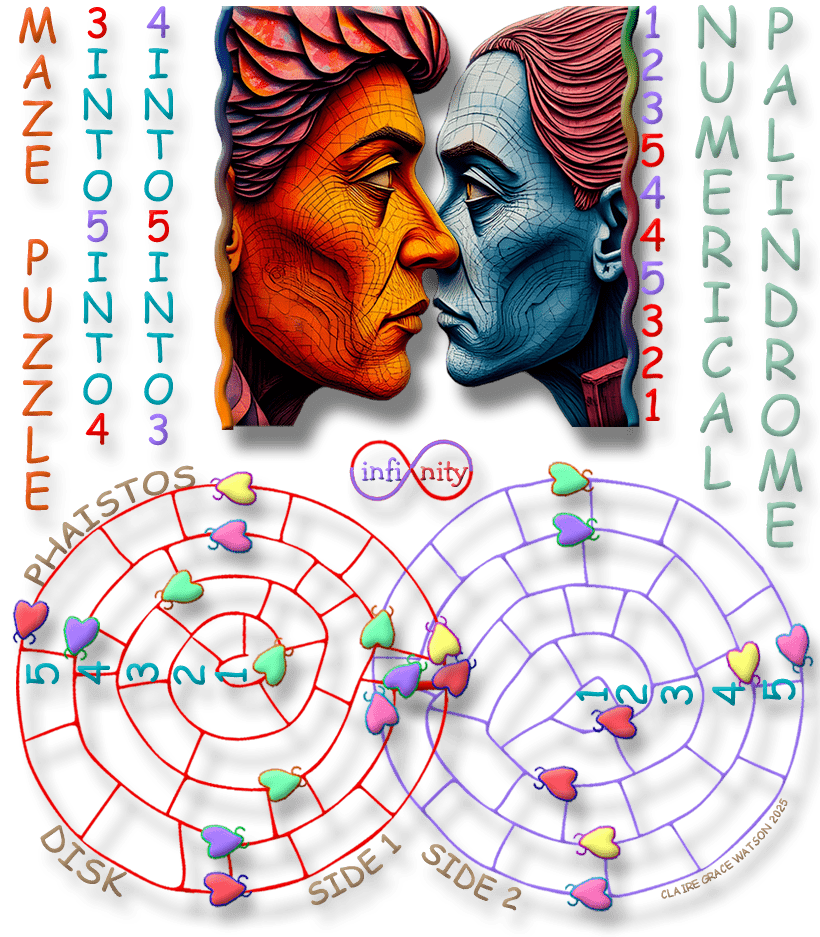
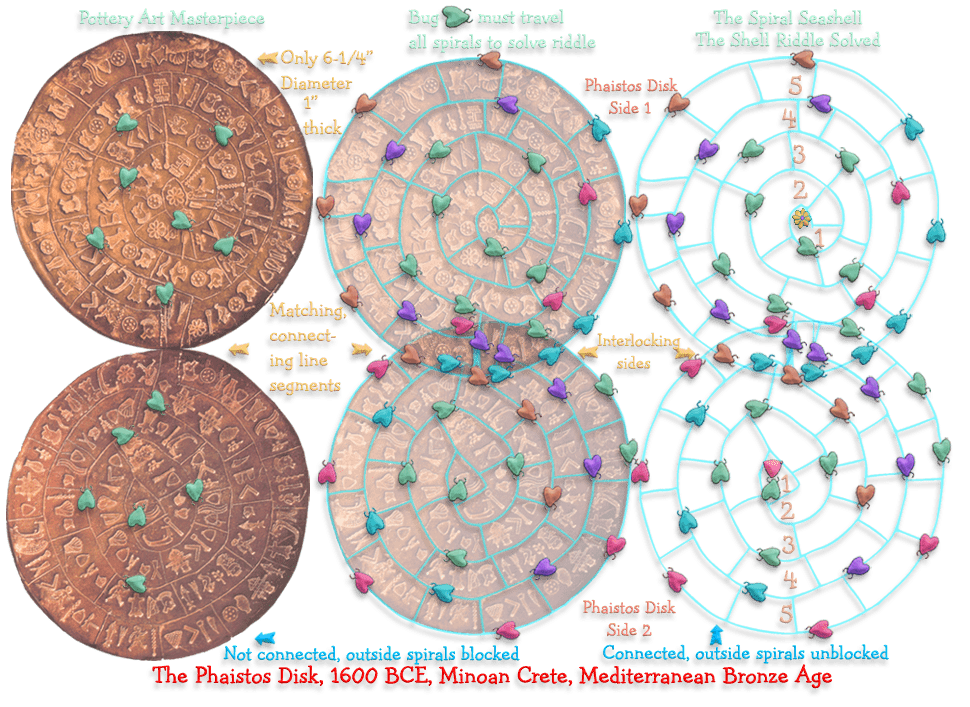 |
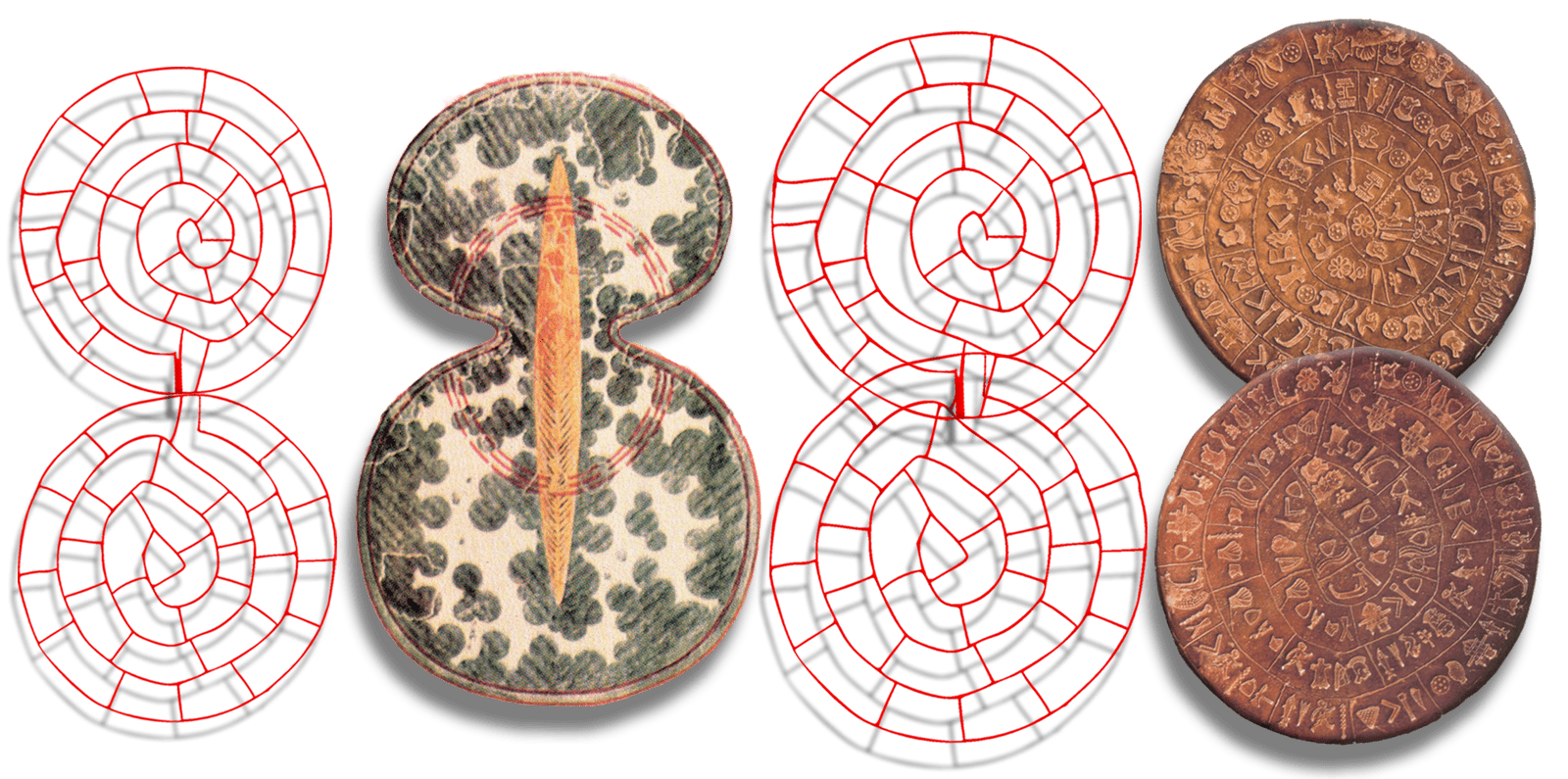 |
The two sides of the Disk (pictographs removed) placed side-by-side this way appear to be a maze. Minoan Crete was the maze civilization, with labyrinths in art and all the associated symbolism: the Double Axe,
On the Phaistos Disk, the outside spirals seem to circle around the center,
while the inside spirals curl in on themselves, and these words also describe the actions of a phi spiral and provide a clue to the solution of the maze. In these
phi spirals, both spirals spin the same direction until you start at the center of one and crossover, and this is exactly what happens on the Phaistos Disk. Then, the journey to the center of the other spiral becomes counter the direction of the first.
If the Phaistos Disk is the
Maze of Daedalus
, then the young Greeks cast into it were as doomed as the legend states. They were told they could avoid being eaten by the Minotaur if they could find their way out, but they would have been hopelessly lost because the spiral's direction is relative, leading only to dead ends. Their deaths were inescapable. Only a
miracle
could save them.
I found the wave spiral and solved the maze by removing the disk pictographs from transparencies I created so that only the
spirals and line segments were visible. Then I placed the two sides together at the matching line segments and merged them by overlaying the perfectly
aligned line segments.
The solution to a maze is the uninterrupted path through an intricate pattern of line segments from a starting point to a goal.
The Disk has a combined 60 line segments and two large spirals, each with five levels. The starting point of this maze is the center of Side 1 (top disk with flower at the center), the goal is the center of Side 2 (bottom disk with wave at the center). To solve the maze, find the uninterrupted path through the line segments of all the spirals, from the center of Side 1 to the center of side 2 and back.
Movement through the maze is simple. Start in the top center (try it, using this image on the left that's missing the pictographs) and spiral out counterclockwise then cross over to the center of Side 2 via the 4th level spiral, now moving clockwise, continue to the center then make the return journey in reverse. The matching,
connecting line segments direct the movement from Side 1 to Side 2 but also prevent travel in the outer
spirals on both sides. Move back and forth freely on these eight spirals, but the maze is not solved until all ten spirals are incorporated into this uninterrupted movement.
Start at the center of Side 1 and trace the spiral around counterclockwise to the 4th level as before, but this time the bridge directs the movement to the outer spiral on Side 2 as the movement changes to clockwise. Cross the bridge again from that outer spiral to the outer spiral on Side 1 now moving counterclockwise. Cross the bridge from the
outer spiral on Side 1 into the 4th spiral on Side 2 moving clockwise and travel to the center. Then make the same journey
in reverse, each time creating the pattern of a figure 8.
Phaistos Disk Hidden Pattern - Figure 8 Wave Spiral, Constellation, Maze Solution Pictographs removed, two sides connected
A...method is used by Claire Grace Watson (Phaistos Disk Literature and Art), to analyze the Phaistos disk to form a Minoan shield resembling the Roman anciles.
I think you have decoded The Phaistos Disk! (Adolfo Rios Pita Giurfa, giurfa.com)
![]() the Figure 8 Shield,
the Figure 8 Shield,  the Minoan Wave Spiral.
the Minoan Wave Spiral. ![]() Minoans saw something profound about a maze, and from their civilization at exactly the same time as the Phaistos Disk came the legendary Maze of Daedalus. We might be looking at it. Maze Solution
Minoans saw something profound about a maze, and from their civilization at exactly the same time as the Phaistos Disk came the legendary Maze of Daedalus. We might be looking at it. Maze Solution
![]()
![]() This Phaistos Disk pictograph suggest a solution to the maze puzzle.
Below, my exact tracing of the Phaistos Disk Maze of Daedalus.
This Phaistos Disk pictograph suggest a solution to the maze puzzle.
Below, my exact tracing of the Phaistos Disk Maze of Daedalus.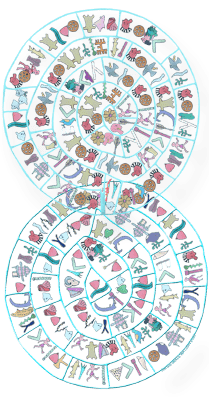 To solve the maze, incorporate the outer spirals by merging them. Overlap the matching, connecting line segments by placing
the bottom image onto the top image to create a bridge. With all ten spirals
connected and the figure 8 created, the maze can be traversed via the bridge in an uninterrupted movement through all the spirals and thus is solved.
PagemapBookmap
To solve the maze, incorporate the outer spirals by merging them. Overlap the matching, connecting line segments by placing
the bottom image onto the top image to create a bridge. With all ten spirals
connected and the figure 8 created, the maze can be traversed via the bridge in an uninterrupted movement through all the spirals and thus is solved.
PagemapBookmap![]() Comments
Comments
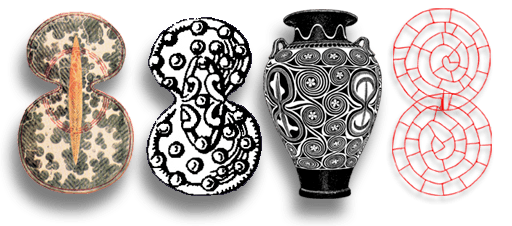
 Copyright Notice - Disk of the World - Text and images copyrighted March 21, 1993-2025, Claire Grace Watson, B.A., M.S.T., U.S. Copyright and under the Digital Millennium Copyright Act of 1998, All rights reserved. No part of this web page may be reproduced or transmitted in any form or by any means without written permission from the author, except for the inclusion of brief quotations in a review.
Copyright Notice - Disk of the World - Text and images copyrighted March 21, 1993-2025, Claire Grace Watson, B.A., M.S.T., U.S. Copyright and under the Digital Millennium Copyright Act of 1998, All rights reserved. No part of this web page may be reproduced or transmitted in any form or by any means without written permission from the author, except for the inclusion of brief quotations in a review.